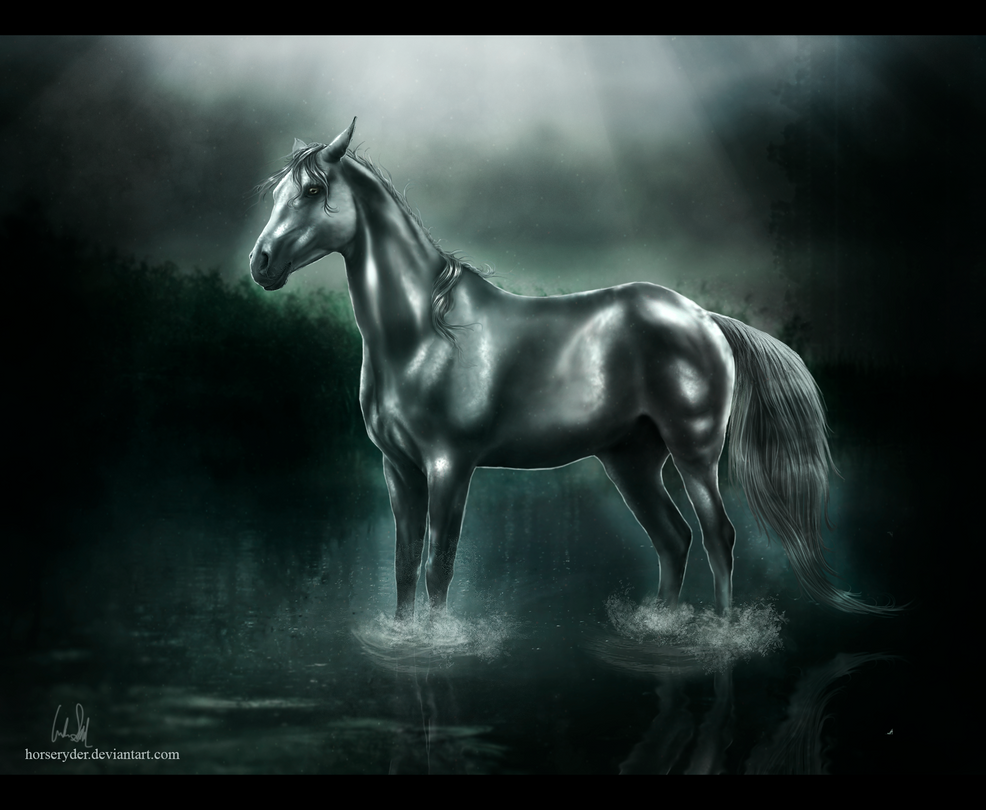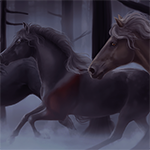It’s cold. Enough to see the clouds of her breath (clouds that should not exist), and raise the prickled bumps of her flesh. She shouldn’t feel it.
Ghosts feel nothing, after all.
It’s still. And there are hazel leaves on the trees beside the shore, silent and still with the morning frost, and they don’t shiver in the breeze. She shouldn’t notice, but she does. She hasn’t known feeling like this in eons. It’s almost like life.
But it isn’t.
It cannot be.
She is not real. She is only a feeling, or rather, a mixture of them - discordant, rattled together until the edges of each one are not distinguishable from the rest. A symphony of all the pieces she was once, lain out across the river; an orchestra turned spector. She’s almost tangible - flesh and bone save for the wisps and curls of her hair that smoke out into fog.
And all is as it was the last time. The willow is still slanted, and the river still spills out into a violent ocean. She stands across her bones not knowing they are her own, because that’s what ghosts do - they come back.
She doesn’t remember the last time, or the significance of her apparition. She doesn’t remember that the river was cold that day, and how it stung her flesh and felt like teeth (and how it feels like that now). She doesn’t remember that she had followed the river until it ended, or all of the sick metaphors that she had pulled from that ending. She doesn’t remember how she drove herself over the edge; out of the river and into the ocean, out of one world and into the next, or how the tide took all of her but the bones she stands over now.
She had sought finality. She had sought a peace she’d never known while she lived.
And what she had found was almost like finality.
What she had found was nearly peace.
There are no complications in the mist. There are no cryptic metaphors. There are no goodbyes. It doesn’t hurt to exist. Cities don’t crumble. Galaxies don’t collapse. She has never been halved, left for dead with the pieces of her being scattered through riverbeds. She cannot remember the last time the silhouette of Her goodbye was burned against the back of her eyelids.
It isn’t enough though.
Because what she still remembers is that she loved her recklessly.
Because what she still remembers is that Cordis was her sun, moon, stars, and gravity.
Because what she still remembers is that she would have been anything for her.
Because finality does not exist without them side by side, and the only peace she’s ever known she had found along the planes of Her flesh.
Death could not erase that.
“Are you alone?” She echoes into the mist.
“Yes,” She answers.
here is the repeated image of a lover destroyed

|
All things end.
This is a lesson that has been taught to her again and again. Sometimes for the better: her time in His lair ended, didn’t it? Never mind that He still haunts her in ways she hates to define.
And they ended. They ended where they began, in a river, in pieces.
(Never mind there’s another heart in her chest, never mind she thinks of her every day, an entirely different sort of haunting.)
They end.
She fights to accept this, to not lose herself in her grief. Time heals all wounds, but they heal jagged and infected, the proud flesh of memories necrotizing her from the inside out.
But she moves on, or she pretends to. She wanders the meadow and river and forest and belongs nowhere. Sometimes she talks to others, fleeting, empty conversations that she is unwilling or unable to carry. She dresses herself in lightning, and she is untouchable, and this, she tells herself, is all she needs.
Today, her chest hurts. The pain is pinpointed to the second heart inside her, the one swallowed up by her body in the river, the last piece of Spyndle she’d ever know. It throbs like an infected tooth. She does her best to ignore it – she is no stranger to pain – but as she walks it worsens. Sighing, she changes directions, moves instead to the river, thinking perhaps the cool water will soothe the fever-heat that spirals in her veins.
The pain worsens as she walks into the water, the lightning temporarily gone from her, nothing but slick and silver now, and it escalates until she can hardly breathe, all fire inside of her, untouched by the water surrounding her on all sides.
The water rises – it shouldn’t be rising, there’s no rain, no reason for it – and then it envelopes her, and she barely notices for the pain, and she sinks down, her hooves hit the river bottom, and she should stop there, but they keep going, like she’s landed on quicksand. The silt of the river floor swallows her knees, then her belly, and finally her head, stretched wildly towards the hazy surface.
At another river, in a land that’s here and not-here, she breaks through the surface. Into the valley, in the shadow of death.
She’s been here once before, when she drew a girl back, sent her to fulfill a vendetta. But that had been purposeful – she’d followed the ravens, then.
So why the river?
She staggers to the surface, dripping wet, and realizes the aching pain in her chest has ceased. The world around her is muted, ghastly, land of the –
oh.
There’s a voice in the mist, like music, like miracles, like home.
The mist is everywhere, and she can’t see her, but she knows that voice better than she knows her own.
“No,” she cries out, and the mist swallows her defiance, “no, you’re not, you’re not-”
She’s almost babbling now, stumbling wet through the fog, towards where the voice had come from, wondering distantly if she’s going mad, but calling out for her nonetheless. There is so little light here, but she creates what she can. She brightens herself, tries to make herself easily spotted, a glare of silver in the mist.
Like a lighthouse, beckoning her home.
c o r d i s
she said it was a mistake to let them burn her at the stake
and she learned a lesson back there in the flames
| |
NEV IM CRYING I LOVE YOU
A flash of silver; a beacon, a lighthouse.
Of course she’s come.
Of course.
The turn of her cheek is jarring in the stillness as she looks across her shoulder, transfixed, through the parting river mist as a familiar shape rises from the water like a phoenix from ashes. A rebirth, how typical, with water that beads and rolls off Her silver skin like pearls (just like the first time).
“No,” says a voice.
It’s a sound that she has both lived and died for.
And she is remembering how the distance between them makes her ache. They are magnets, after all, and the galaxies between them must have stretched them both for miles and miles over the years. But she doesn’t run to Her. She might if she were not so afraid of unraveling into nothing.
Because She has always been home.
She has always been the shore.
“No, you’re not, you’re not -” and then Cordis’ light finds her. It casts shadows on her skin that roll like the tides of the ocean beyond them. ‘Alive,’ Spyndle will think, shook suddenly with the idea that this beginning will mean one more inevitable ending.
That this is just one more goodbye.
That this will become the last time, before she smokes out into the fog.
“You found me,” she says instead.
‘I’m sorry,’ is what she means.
Because she’s sorry for the sunsets. She’s sorry for the goodbyes. She’s sorry for the ache in Her chest, and how She’d known her bones in the river bed (the ones she stands over now, the ones she is beginning to remember).
Because she’s sorry that love is an act of bravery and that she became a coward.
Because she’s sorry that once Cordis drew maps along her skin, and underlined with her teeth the most important parts of her, and that the last time was the last time.
“You found me.”
;_; I MISSED THEM!
here is the repeated image of a lover destroyed

|
She’s as beautiful and terrible as the day they first met, when some catalyst occurred somewhere in the river, somewhere in their words. She never quite knew what happened, after, only that something about her and her life had been deeply changed. She didn’t know quite what, but she could feel the shifting taking place inside her.
This is what the earth felt, perhaps, as pangea fractured into continents. A fundamental reformation.
There’s still the thought – this isn’t real, you’re dreaming her again - but the cold truth of the matter is Cordis could never dream her like this, the Spyndle she makes in her dreams is a pale imitation of the thing before her.
Her Spyndle. Darling, dearest, dead.
(you found me)
“Of course,” she whispers, and there are tears raking down her cheek, like claws, and she’s happy and terrified all at once, on his dying shore, before this ghost of a woman who’s too solid and too there to be anything but real.
“I have your heart,” she says. She means it in both the literal and figurative sense. The whole metaphor is overwrought and heavy, and she thinks again of the poem, one of the only ones she knows – I carry your heart, I carry it in my heart.
Yes, and yes.
She’s almost blind for the amount of tears stinging her eyes. She wonders if Spyndle can cry. How there she really is. Wonders if she can touch her, or if her muzzle would simply pass through.
She’s close enough to touch her, now, and the light she had emitted slowly sinks back into her skin until there is only a soft glow that illuminates them on this distant, wretched shore. But she doesn’t touch. She doesn’t need to.
(Want, yes. But not need. She doesn’t break the spell.)
“I missed you,” she says. The three words aren’t enough, they don’t do justice to how she feels in her absence, but this is not something she has a poem for.
c o r d i s
I’ll touch you all and make damn sure
that no one touches me
| |
|


